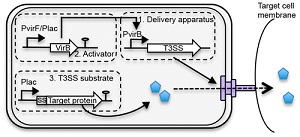 |
| A diagram showing details of the secretion system used in certain bacteria to deliver proteins--Courtesy of Mass. Gen. Hospital |
Many delivery platforms are based in part on organisms existing in nature, such as bacteria or viruses, and now researchers at Massachusetts General Hospital have turned to the common Escherichia coli bacterium and instilled it with a natural ability to transport proteins.
Bacteria, one called Shigella flexneri in particular, make use of a secretion system to deliver important proteins to mammalian cells, according to a report from Chemical & Engineering News. Translating this ability over to a safe drug delivery system first required a harmless lab strain of E. coli that could then be engineered with S. flexneri's system to synthesize a muscle protein and insert it directly into human cells.
Normally, the secretion system from S. flexneri causes diarrhea in humans, but by transferring that system over to relatively safe E. coli strains, the scientists were able to overcome some of the pitfalls that others have encountered in the past, especially in patients with compromised immune systems, according to the report.
In the study, E. coli successfully delivered the gene for a muscle-related protein called MyoD into human cancer cells. Down the road, the team is looking to use the bacteria to secrete anti-inflammatory proteins to treat inflammatory bowel disease.
In the abstract published in the journal ACS Synthetic Biology, scientist Cammie Lesser and her team write: "Combining these elements, we found that coordinated expression of the type 3 secretion system and modified target protein substrates produces a nonpathogenic strain that expresses, secretes, and delivers heterologous proteins into mammalian cells. This reengineered system thus provides a highly flexible protein delivery platform with potential for future therapeutic applications."
- here's the C&EN report
- and here's the abstract